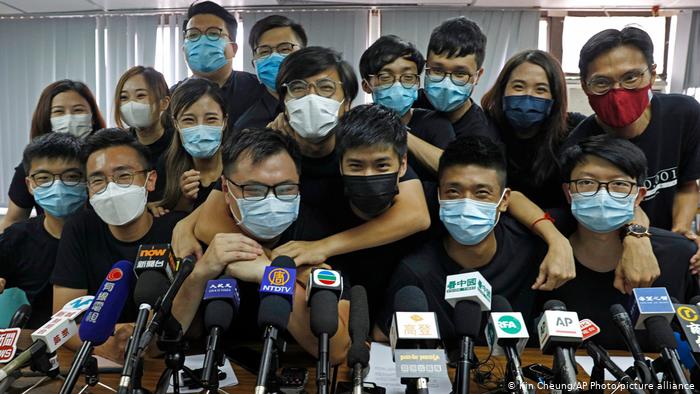Opposition figures have linked the arrests to an unofficial primary organized by the pro-democracy camp last year. It is one of the largest crackdowns yet under Beijing's national security law.
About 50 pro-democracy activists in Hong Kong were arrested on Wednesday by the city's police on suspicion of "subversion" under a controversial Beijing-imposed national security law.
The arrests included at least seven members of Hong Kong's Democratic Party, the territory's largest opposition party.
Opposition figures said the arrests were linked to an unofficial primary organized by pro-democracy parties ahead of local legislative elections.
The campaign, called "35+ citizens vote" was to determine which candidates would give the pro-democracy camp the best chance to fill all 35 electable seats in Hong Kong's legislative council, a body with only half of 70 seats directly elected.
At the time Hong Kong's government labelled the primary "illegal" and disqualified 12 candidates. Chief Executive Carrie Lam postponed the election for a year, citing a surge in coronavirus cases.
Who has been arrested?
Former Hong Kong Democratic Party chairman Wu Chi-wai, former lawmaker Helena Wong, Lam Cheuk-ting and James To were all arrested, according to the party's Facebook page.
The home of Joshua Wong, a prominent jailed pro-democracy activist, was also raided Wednesday morning, according to posts on his social media accounts.
A US citizen working for a Hong Kong human rights law firm, Ho Tse Wai and Partners, was also among those arrested on suspicion of subversion, police told local media.
'Shocking and heartbreaking'
Glacier Kwong, a prominent Hong Kong activist living in Germany told DW the arrests were "worrying and deeply concerning."
"This is a political crackdown on the pro-democracy camp and it was carried out in order to ensure that they will be detained for a long period of time. The mass arrest is aiming to weaken the pro-democracy figures’ influence in Hong Kong and abroad."
"I think this implies that the legislative council will be nothing more than a rubber stamp from now, Kwong said, adding: "What Beijing wants is full compliance to its regime."
She told DW she feels: "very afraid and terrified seeing those arrests, because those are the friends and colleagues who I have worked with. I can’t imagine how other people who are not activists see outspoken people to be arrested."
Sunny Cheung, a Hong Kong activist and candidate who contested the 35+ citizens vote primaries but since fled the semi-autonomous region told DW that the arrests were "totally absurd."
"Many countries have their own primaries too, and this should not constitute any crime," he added.
"As a participant and nominee in the primary, I would be definitely arrested if I were still in Hong Kong. The news is shocking and heartbreaking. Witnessing all of them, my friends and companions, being arrested is really speechless," he told DW.
In a tweet, he urged "the US government and Free World to stay alert and stand with Hong Kong."
When US is handling the election certification, HK gov just arrests nearly all pro-democracy activists and nominees in the primaries today.
— Sunny Cheung 張崑陽 (@SunnyCheungky) January 6, 2021
As a nominee in the democratic primaries, I urge the US gov and Free World to stay alert and stand with HK by all means.@JoeBiden @POTUS pic.twitter.com/F1A4IqJpeI
EU calls for activists' release
The EU called for the immediate release of those arrested today in Hong Kong under National Security Law. It said it was eyeing further sanctions on China over its crackdown in the territory.
"We are currently analyzing the situation to see how we might need to react. There are other possibilities open to us, sanctions for example," European Commission spokesman Peter Stano told journalists.
What is happening in Hong Kong?
Under the so-called "one country, two systems" policy, Hong Kong enjoys a measure of autonomy not found in mainland China, including a free press and freedom of assembly.
However, Beijing began stamping out political opposition to its increasingly interventionist policy, following massive pro-democracy street protests in 2019.
In June 2020, Beijing passed a national security law targeting acts Beijing deems to be secession, subversion, terrorism and collusion with foreign forces.
Critics say it diminishes Hong Kong's autonomy and removes the city's independent judiciary, allowing Communist Party-controlled courts in mainland China jurisdiction over "security crimes" and allowing Beijing's security agents to operate openly in Hong Kong.
Since the national security law was passed — which bypassed Hong Kong's legislature — prominent democracy supporters have been arrested, jailed, barred from politics or have fled overseas.
Latest Stories
-
Wontumi visits Bawumia after release from EOCO custody
4 seconds -
Scott Evans ‘blasts’ Team Eternity over their TGMA nonchalance
3 minutes -
3 Schoolchildren injured in Kasoa Ofaakor electricity cable collapse horror
14 minutes -
New 9-member MIIF Board inaugurated to drive strategic transformation
25 minutes -
Gyakie’s ‘Sankofa’ debuts on Billboard U.S. Afrobeats Chart, trends Top 5 on YouTube Ghana
50 minutes -
Darkness defied: Ghana’s race to 99.8% power by 2030 hits crucial phase
56 minutes -
Ill health without proof of incapacitation no excuse to evade justice – OSP’s Sammy Darko
1 hour -
Widows’ plight: Techiman leaders demand action at Heroes of the Region Awards
1 hour -
Chancellor of University of Gold Coast unveils vision for Africa’s leadership future
1 hour -
AETC 2025 closes in Accra with bold vision for Africa’s energy future
1 hour -
Japan promises to support Volivo bridge project; invites Mahama to TICAD
1 hour -
GoldBod targets cutting-edge digital traceability technology before 2026
1 hour -
Ghana Digital Centres CEO backs private sector in tech jobs push
2 hours -
Mahama hints at ideal value of cedi, urges support for export sector
2 hours -
Everyone wants to stand in the shade… But nobody wants to plant a tree
2 hours

